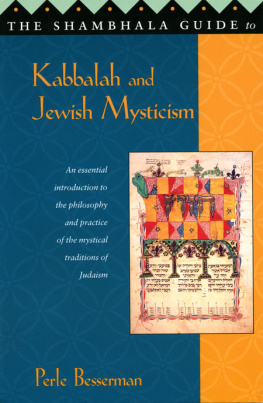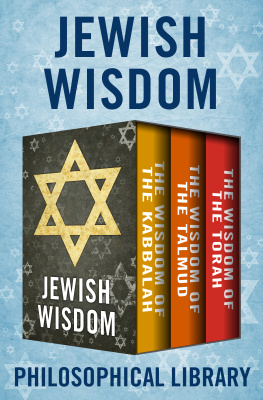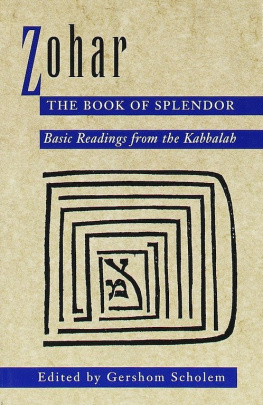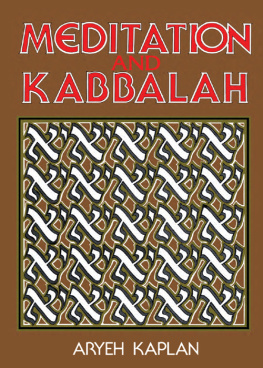
This edition published in 2017 by Arcturus Publishing Limited
26/27 Bickels Yard, 151153 Bermondsey Street,
London SE1 3HA
Copyright 2005 Arcturus Publishing Limited
All rights reserved. No part of this publication may be reproduced, stored in a retrieval system, or transmitted, in any form or by any means, electronic, mechanical, photocopying, recording or otherwise, without written permission in accordance with the provisions of the Copyright Act 1956 (as amended). Any person or persons who do any unauthorized act in relation to this publication may be liable to criminal prosecution and civil claims for damages.
Cover Image: Tree of Life (Stoclet Frieze) by Gustav Klimt (18621918), Osterreichisches Galerie, Vienna, Austria/ www.bridgeman.co.uk
In loving memory of my mother, Sara Peninah bat Avraham, who died 7 Adar 5767, the yahrzeit of Moshe Rabbeinu.
... and to the feminine in my life.
Contents
Illustrations
Tables
Introduction:
What is Kabbalah?
Defining Kabbalah is not a simple matter. Before we can even proceed to a dictionary, we have the problem of spelling. Does it begin with a K, a C or a Q? And that's just the first letter! This is not a trivial problem, for the plethora of spellings (at least six, and some give two dozen!) is not only a problem of transliteration from the Hebrew original. The diverse spellings reflect the diverse traditions within which Kabbalah has played its part.
Before coming to those diverse traditions, let me clarify the definition that is central to this book. Kabbalah is Judaism's inner teaching. It primarily addresses the nature of God and the secret meanings of the Torah (the core of God's revelation to humanity). In a secondary sense, Kabbalah explores the deep structure of the mind and of outer reality. (The meaning of 'Torah' is addressed in . All Hebrew terms are included in the glossary at the end of the book.)
The reason for the diverse traditions surrounding Kabbalah derives from the position of Judaism itself. Judaism is the root monotheistic religion from which are derived the major forces that have shaped much of the modern world. This may seem to be an extreme claim, but when we consider the impact over the ages of Christianity and Islam both of which sprang from the Judaic core teaching then the claim may be justifiable. It is not simply that Christianity and Islam have spread monotheism to large parts of the globe. It is also important to recognize the impact of these two religions in shaping modern consciousness. The great philosophical movements that have been responsible for so many of the ways in which we think today arose, or were transmitted, through Muslim and Christian, as well as Jewish, thinkers.
By dint of the widespread influence of the Hebrew Scriptures (the 'Old Testament'), the inner teachings revealing the secrets of those Scriptures have had a broad influence. For example, Jewish teachings on the mysticism of language influenced the earliest phase of the development of Islamic thought. Of especial importance for the diverse forms of Kabbalah in our day was the influence Kabbalah had on Christian thinkers in the early Renaissance. The discovery of a 'new world' of complex ideas about the deeper meanings of Scripture fired the imaginations of these thinkers. Critically, as far as the development of Kabbalah was concerned, this interreligious contact led to the view that the mysticism associated with the Hebrew Scriptures was viable beyond the Jewish matrix within which it had previously been confined. In many ways, this view was a logical continuation of a trend initiated in Christianity's earliest formative period. The teachings which gave rise to Christianity in the early centuries of the Common Era forced an ambivalence towards Judaism: on the one hand, Christian teachings accepted the divine status of the writings that Judaism held as sacred; on the other hand, those same Christian teachings denied that the legal framework of the Torah the most important of those writings was binding. In a similar fashion, Renaissance Christian thinkers imbibed the Jewish mystical teachings whilst eschewing the ritual context within which the teachings had been understood in Judaism. This period provided the impetus towards a view that is current to this day, namely, that Kabbalah is not uniquely a preserve of Judaism.
The diverse forms of Kabbalah, with their distinctive spellings, may be traced to these beginnings of the 'Christian Cabala', as it became known. As indicated in my spelling here, the version with a C stems from this period. Moreover, the Q version may also be traced to this Renaissance connection with Christianity. The form 'Qabalah' is generally used when referring to a version of Kabbalah concerned with magic and the occult. Again, it was the same early Renaissance thinkers who instigated this trend, for they were fascinated with the worldview of magic, which they erroneously thought of as deriving from ancient Egypt. Whilst there clearly are older roots of the occult, the peculiarly 'kabbalistic' form it has taken over recent centuries stems from the Renaissance.
This book is not concerned with Cs and Qs, but with K. My interest is with Kabbalah as it has developed, and as it is practised today, within Judaism. This is not to imply that I take an exclusivist position. On the contrary, I believe that Kabbalah has much to offer anyone who seeks a viable path of mysticism related to those Scriptures that have helped shape Western consciousness. But I take the view that it is only within its Jewish setting that Kabbalah can be fully understood. Kabbalah is not simply an intellectual, or even 'spiritual', teaching; it constitutes a way, a holistic path in life. That holism is broken when it is torn from the religious framework within which it is organically situated. The 'Christian Cabala' is responsible for an unfortunate misperception of kabbalistic teachings, and there is a need to heal the distortions to which that historical chapter gave rise.
Jewish mysticism has a long and complex history, major themes of which I address in . The phrase I have used above, 'Judaism's inner teaching', is largely synonymous with 'Jewish mysticism'. And, in general, I identify Kabbalah with the broad sweep of Jewish mysticism. However, there are good reasons for maintaining some separation between these terms. Firstly, there is no clear demarcation between mystical Judaism and a supposedly non-mystical religion that goes under the name of 'Judaism'. The essence of Kabbalah concerns its reverence for Judaism's sacred text, the Torah, and the ways in which it attempts to open that text in order to reveal the inner secrets contained therein on account of its divine status. This essence is totally shared with that of Rabbinic Judaism, the mainstream path of Judaism that has lasted for at least two thousand years. There is effectively no such thing as 'non-mystical Judaism', and the term 'Judaism's inner teaching' applies across the board. The major kabbalists were all completely infused with the ways of Rabbinic Judaism. Indeed many played central roles in the development of Jewish law, in addition to helping to shape the kabbalistic heritage.
A second differentiation between key terms, this one between 'Kabbalah' and 'Jewish Mysticism', is generally made on account of distinctive characteristics of the former when compared to the earliest phase of Jewish mysticism. Kabbalah is thought of as a specific expression of the more inclusive term 'Jewish Mysticism'. For many scholars, the term 'Kabbalah' refers to a mystical approach, coming to the fore from the twelfth century onwards, which focuses on a specific set of symbols, the
Next page






